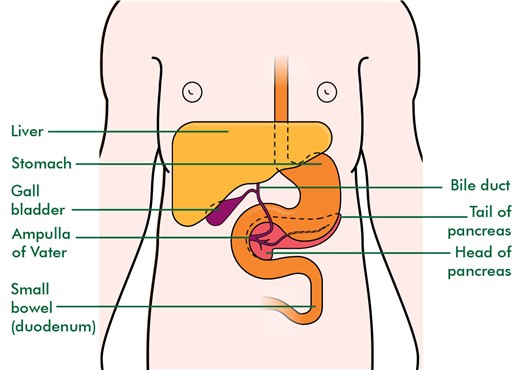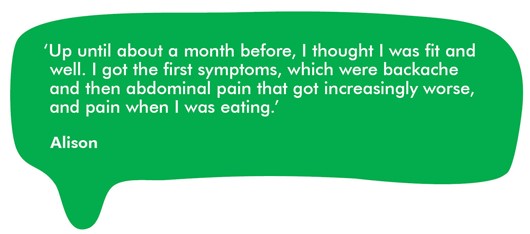November is Pancreatic Cancer Awareness Month. About 8, 800 people are diagnosed with pancreatic cancer in the UK each year. In this blog, editorial assistant Amy-Louise explains what pancreatic cancer is, the symptoms and the causes and risk factors.
What is the pancreas?
The pancreas is part of the digestive system. It has two main roles. It makes:

Cancer can occur in any part of the pancreas, but around 6 or 7 in every 10 pancreatic cancers (60 to 70%) start in the head of the pancreas. The head of the pancreas is the large rounded section next to the first part of the small bowel (the duodenum).
The other two main parts of the pancreas are:
There are several different types of pancreatic cancer. The most common type is ductal adenocarcinoma, which starts from cells in the lining of the pancreatic ducts. We have more information about the other types of pancreatic cancer on our website and in our booklet, Understanding cancer of the pancreas.
What are the symptoms of pancreatic cancer?
Pancreatic cancer may not cause symptoms for a long time and some people may only have one symptom. This can make it harder to diagnose early.
The most common symptoms of pancreatic cancer include:
It is important to remember that most pain in the abdomen is not caused by cancer of the pancreas. Speak to your doctor if you are worried.
Other symptoms include:

What are the risk factors and causes?
The main risk factors for cancer of the pancreas are:
Certain medical conditions, such as chronic pancreatitis and diabetes, can also increase the risk. Our booklet has more information.
Where can I find more information and support?
We have a video in which Surgeon Charles Imber provides some more information about what pancreatic cancer is and what symptoms to look out for.
You can also read more about pancreatic cancer in our booklet Understanding cancer of the pancreas. We also have more information on our website.
You can call our cancer support specialists on 0808 808 00 00, or you could visit our Online Community to talk to people affected by pancreatic cancer.
Pancreatic Cancer UK and Pancreatic Cancer Action provide information and support to people affected by pancreatic cancer.
To see what else Macmillan's cancer information team has been blogging about, please visit our blog home page! You can subscribe to receive our blogs by email or RSS too.
We're with you every step of the way
The Macmillan team is here to help. Our cancer support specialists can answer your questions, offer support, or simply listen if you need a chat. Call us free on 0808 808 00 00.
Comments? Feel free to add them below (you need to be logged in).
Keep in touch Follow Macmillan’s cancer information team on Twitter @mac_cancerinfo
Whatever cancer throws your way, we’re right there with you.
We’re here to provide physical, financial and emotional support.
© Macmillan Cancer Support 2025 © Macmillan Cancer Support, registered charity in England and Wales (261017), Scotland (SC039907) and the Isle of Man (604). Also operating in Northern Ireland. A company limited by guarantee, registered in England and Wales company number 2400969. Isle of Man company number 4694F. Registered office: 3rd Floor, Bronze Building, The Forge, 105 Sumner Street, London, SE1 9HZ. VAT no: 668265007